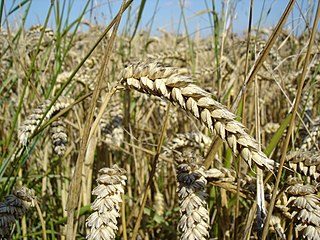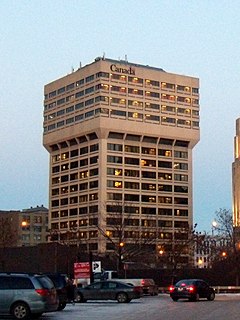William Craig McNamara (August 8, 1904 – April 12, 1984) was chief commissioner of the Canadian Wheat Board from 1958 to 1970 and then a member of the Canadian Senate.

The Canadian Wheat Board was a marketing board for wheat and barley in Western Canada. Established by the Parliament of Canada on 5 July 1935, its operation was governed by the Canadian Wheat Board Act as a mandatory producer marketing system for wheat and barley in Alberta, Saskatchewan, Manitoba, and a small part of British Columbia. It was illegal for any farmer in areas under the CWB's jurisdiction to sell their wheat and barley through any other channel than the CWB. Although often called a monopoly, it was actually a monopsony since it was the only buyer of wheat and barley. It was a marketing agency acting on behalf of Western Canadian farmers, passing all profits from its operation back to farmers. Its market power over wheat and barley marketing was referred to as the "Single Desk".
The CWB’s mandate was to pay farmers a base price for their grain, identify markets, negotiate the best price, deliver the goods, issue advance cheques and make final payment after the crop was sold. If the wheat market went up, farmers pocketed the profits. If the market went down, the government absorbed the loss. Nothing was subtracted from the farmer’s share except the cost of marketing and delivery.
He was born in Winnipeg, Manitoba but raised in Regina, Saskatchewan and was called "Bill Mac" by his friends. He was instrumental in opening overseas markets to Canadian wheat. In the 1960s, he led delegations to the Soviet Union and the People's Republic of China to negotiate wheat sales to those countries. [1]

Regina is the capital city of the Canadian province of Saskatchewan. The city is the second-largest in the province, after Saskatoon, and a cultural and commercial centre for southern Saskatchewan. It is governed by Regina City Council. The city is surrounded by the Rural Municipality of Sherwood No. 159.

Wheat is a grass widely cultivated for its seed, a cereal grain which is a worldwide staple food. The many species of wheat together make up the genus Triticum; the most widely grown is common wheat.

The Soviet Union, officially the Union of Soviet Socialist Republics (USSR), was a socialist state in Eurasia that existed from 1922 to 1991. Nominally a union of multiple national Soviet republics, its government and economy were highly centralized. The country was a one-party state, governed by the Communist Party with Moscow as its capital in its largest republic, the Russian Soviet Federative Socialist Republic. Other major urban centres were Leningrad, Kiev, Minsk, Alma-Ata, and Novosibirsk. It spanned over 10,000 kilometres east to west across 11 time zones, and over 7,200 kilometres north to south. It had five climate zones: tundra, taiga, steppes, desert and mountains.
In 1923, McNamara found work with the Standard Bank of Canada but left in 1924 to become an office boy with the Saskatchewan Wheat Pool. [1]

The Standard Bank of Canada was a Canadian bank established in 1873 as the St. Lawrence Bank by a group of Toronto businessmen led by John Charles Fitch.

The Saskatchewan Wheat Pool was a grain handling, agri-food processing and marketing company based in Regina, Saskatchewan. The Pool created a network of marketing alliances in North America and internationally which made it the largest agricultural grain handling operation in the province of Saskatchewan. Before becoming Viterra, SWP had operated 276 retail outlets and more than 100 grain handling and marketing centres. The Saskatchewan Wheat Pool operated under the name of AgPro in the prairie provinces of Manitoba and Alberta. Begun as a co-operative in the 1920s, the company became a publicly traded corporation in the 1990s. After the 2007 takeover of its competitor, Winnipeg-based Agricore United, the Pool name was retired. The merged company operated under the name Viterra until 2013, when it was acquired by Glencore International.
He joined the Canadian Wheat Board in 1942 and was appointed commissioner in 1955 becoming assistant chief commissioner in 1947 and then chief commissioner in 1958. He held that position until 1970 when he was appointed to the Senate where he sat as a Liberal representing Manitoba. He retired from the upper house in 1979. [1]

The Liberal Party of Canada is the oldest and longest-serving governing political party in Canada. The Liberals form the current government, elected in 2015. The party has dominated federal politics for much of Canada's history, holding power for almost 69 years in the 20th century—more than any other party in a developed country—and as a result, it is sometimes referred to as Canada's "natural governing party".

Manitoba is a province at the longitudinal centre of Canada. It is often considered one of the three prairie provinces and is Canada's fifth-most populous province with its estimated 1.3 million people. Manitoba covers 649,950 square kilometres (250,900 sq mi) with a widely varied landscape, stretching from the northern oceanic coastline to the southern border with the United States. The province is bordered by the provinces of Ontario to the east and Saskatchewan to the west, the territories of Nunavut to the north, and Northwest Territories to the northwest, and the U.S. states of North Dakota and Minnesota to the south.
An upper house is one of two chambers of a bicameral legislature, the other chamber being the lower house. The house formally designated as the upper house is usually smaller and often has more restricted power than the lower house. Examples of upper houses in countries include the Australian Senate, Brazil's Senado Federal, the Canadian Senate, France's Sénat, Germany's Bundesrat, India's Rajya Sabha, Ireland's Seanad, Malaysia's Dewan Negara, the Netherlands' Eerste Kamer, Pakistan's Senate of Pakistan, Russia's Federation Council, Switzerland's Council of States, United Kingdom's House of Lords and the United States Senate.
McNamara was known as a tough and stubborn trader in the wheat business. He built trading relationships abroad by visiting foreign customers and inviting them to visit Canada in return. [1]
Under McNamara, wheat prices remained relatively stable, customers where guaranteed a fixed price for the life of the sale while the United States wished to sell its wheat on a sliding scale with the price fluctuating based on market demands. The difference in approach led to a complaint from the United States that Canada had pegged the world price of wheat. [1]
McNamara argued that this policy kept prices stable and prevented the price from dropping sharply - the Wheat Board under his stewardship would also withhold wheat from the market when demand was soft in order to keep the price stable. "We are out to sell to the best advantage of the Canadian producer," he said. "This dominates our thinking; this is what we were created for." [1]









